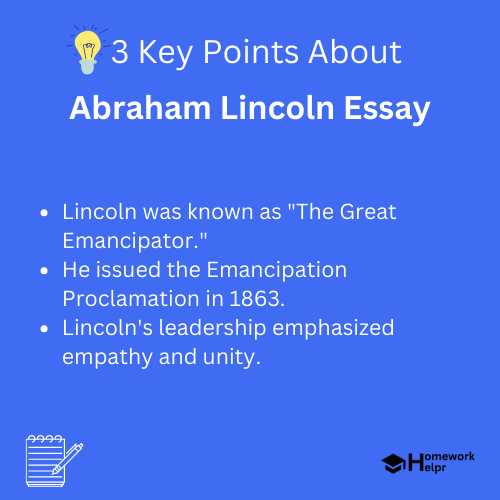📝 Summary
Abraham Lincoln, the 16th President of the United States, is celebrated as “The Great Emancipator” for his role in abolishing slavery during the Civil War. Born in 1809, Lincoln faced challenges in his early life but became a self-taught lawyer and politician. His issuance of the Emancipation Proclamation in 1863 marked a significant step towards freedom for enslaved individuals. Despite his assassination in 1865, Lincoln‚’ commitment to democracy and unity leaves a lasting impact on American history, shaping values of freedom and equality that resonate today.}
Abraham Lincoln: The Great Emancipator
Abraham Lincoln, the 16th President of the United States, is one of the most revered figures in American history. Born on February 12, 1809, in Hardin County, Kentucky, Lincoln rose from humble beginnings to become a prominent leader during a tumultuous period in the nation‚’ history. His impact on the country during the Civil War and his role in abolishing slavery has earned him the title of “The Great Emancipator.”
Early Life and Education
Lincoln’s early life was characterized by hardship and perseverance. He grew up in a one-room log cabin, with limited access to formal education. However, he was an avid reader and taught himself various subjects, including grammar, mathematics, and law. Lincoln famously said, ‚ÄúThe members of my family were all poor, and I had to work hard‚Ķ” This determination to educate himself laid the foundation for his future success.

Legal Career and Entry into Politics
Lincoln’s journey into politics began when he was elected to the Illinois State Legislature in 1834. He later became a successful lawyer in Springfield, known for his self-taught legal knowledge and skills. His practice flourished, but it was his profound ability to connect with people that marked his initial political career. He served a single term in Congress from 1847 to 1849 before returning to local politics and further building his reputation.
Definition
Self-taught: Learning or instructing oneself without formal education or guidance.
Examples
Example 1: Lincoln learned to read and write without formal schooling, eventually becoming a skilled lawyer.
Examples
Example 2: His ability to present legal arguments clearly contributed to many law cases he won.
The Civil War Era
As tensions escalated between the North and South, Lincoln emerged as a pivotal figure. He was elected President in 1860, and his election prompted several southern states to secede from the Union. The Union’s fight against the Confederacy began, marking the start of the Civil War in 1861. Throughout the war, Lincoln’s leadership was characterized by his steadfast commitment to preserving the Union.
Emancipation Proclamation
Perhaps Lincoln’s most significant achievement was the issuance of the Emancipation Proclamation on January 1, 1863. This landmark executive order declared that all slaves in the Confederate states were to be freed. While it did not immediately free all enslaved individuals, it was a crucial step toward the eventual abolition of slavery across the nation.
- Impact: Changed the character and goals of the war.
- Inspiration: Encouraged African Americans to join the Union Army.
- Legacy: Set the stage for the Thirteenth Amendment, which abolished slavery entirely.
❓Did You Know?
Lincoln was known to have a great sense of humor, often using humor in his speeches to connect with people and diffuse tense situations.
Lincoln’s Leadership Style
Lincoln’s leadership style was marked by his exceptional ability to communicate and connect with a diverse range of individuals, from generals to common citizens. He believed in the power of empathy and often visited battlefields to understand the struggles of his soldiers. His Letters to soldiers’ families and public speeches often reflected his deep compassion for the human cost of the war.
Definition
Empathy: The ability to understand and share the feelings of another.
Assassination and Legacy
Tragically, Lincoln’s life was cut short when he was assassinated by John Wilkes Booth on April 14, 1865, just days after the Civil War ended. His death shocked the nation and left an indelible mark on American history. Lincoln is remembered for his principles of freedom, democracy, and unity. His speeches, especially the Gettysburg Address, continue to inspire generations.
Examples
Example 1: Lincoln’s ‚ÄúFour score and seven years ago” in the Gettysburg Address echoes the values of equality in the Declaration of Independence.
Examples
Example 2: His leadership during the Civil War exemplified the balance between firmness and compassion.
Influence on American History
Lincoln’s influence on American history cannot be overstated. His presidency marked a turning point in the nation’s values, transitioning towards a more inclusive and united country. The Thirteenth, Fourteenth, and Fifteenth Amendments to the Constitution, which address slavery, citizenship, and voting rights, are a testament to his legacy.
Moreover, Lincoln’s steadfast belief in the democratic process and his vision for a united nation have made him a symbol of integrity and righteousness. His commitment to ensuring freedom for all will forever resonate throughout American history.
Conclusion
In conclusion, Abraham Lincoln’s life and leadership present a profound story of resilience and commitment to justice. From his humble beginnings to the highest office in the land, he navigated challenges with a sense of purpose and empathy that remains exemplary today. His role in shaping the course of American history during one of its most challenging periods cannot be understated. Lincoln’s legacy of freedom and unity continues to inspire and guide future generations in their quest for equality and justice.
Related Questions on Abraham Lincoln Essay for Students and Children
What is the Emancipation Proclamation?
Answer: It declared freedom for slaves in Confederate states.
When was Lincoln assassinated?
Answer: He was assassinated on April 14, 1865.
What amendments are associated with Lincoln’s legacy?
Answer: The Thirteenth, Fourteenth, and Fifteenth Amendments.
What were Lincoln’s early life challenges?
Answer: He grew up in poverty with limited education.
